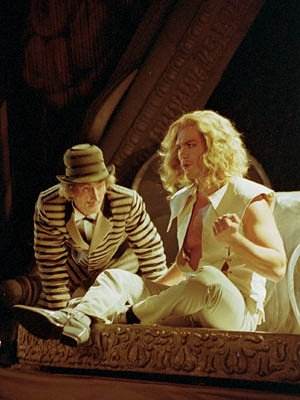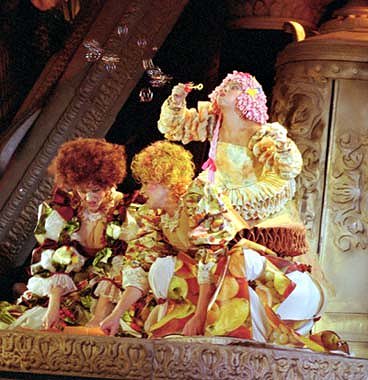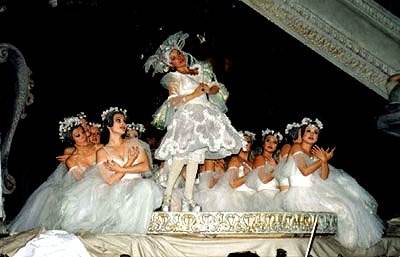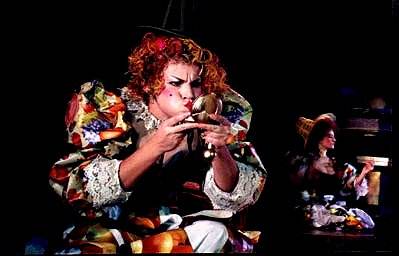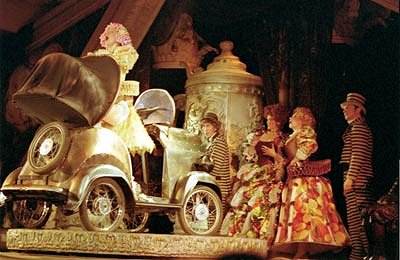S & H International Opera Review
A bawdy knight out at the Boar’s Head…
Verdi, Falstaff, The Helikon Opera, Moscow, 8th February 2003 (NM)
Even before the first downbeat, lithographs of graphic C19th pornography in the program-notes set the tone for a fornicating Falstaff at Moscow’s "art-house" opera venue, the Helikon. The plump young ladies are mischievously titled with quotations from Richard Wagner, appended by producer Dmitry Bertmann – "Germans should stay as far as possible from the penetrations of Italian opera", "Our performers only shine in defiled works", and a centre-fold of a stout matron administering the cane to the buttocks of a willing and shapely girl, labelled "the power of the Dramatist over the Artist should be without limit".
Yet, as the crowning glory of Verdi’s compositional career, Falstaff is a multi-layered work of subtlety and complexity…and Bertmann’s passion for psychological games and intrigues has him toying with his audience from the outset. For on-stage, there is no sex at all. Like all victims of the porno industry, Sir John is ultimately an unhappy loner, obsessed that "someone else somewhere is getting better sex than he is" – if only he could find out where? There’s a strong implication that if this Sir John – a virile middle-aged man with good looks and much talent – could only drop his obsessive search for sexual conquests for a while, he might even find happiness with someone? Mistress Quickly would certainly be open to offers, we soon see. Vladmir Ognev achieves the perfect blend of posing and pathos as the would-be Lothario, with a mighty bass-baritone that he holds in perfect control. He carefully allowed the more charming side of Sir John to show through in "quando ero un paggio", and perfectly portrayed the suicidal dejection of "va, vecchio John".
Taking over the musical direction of this revival is Vladimir Ponkin in his first season as Music Director of the company, after several seasons of guest-conducting new productions. He certainly has the full-blown Verdi style magnificently, and the crash-boom strettos bristled with energy and dynamism. However, the more subtle ensemble moments sounded as though they needed more rehearsal-time to bed-in – the octet seemed to be feeling its way, and the nonette at the Oak Of Herne teetered precariously at times. Against this, the solo work in the orchestra shone with new glory – is this dazzling ensemble really the same band who slunk shame-facedly through Traviata five years ago?
The stage is framed - with vast picture-frames, at odd angles, with canvases of rubber strips through which appear the writhing, sensual naked limbs of Sir John’s fervent, fevered and frustrated sexual longings. The Garter Inn is a giant revolving plate, complete with monstrous utensils, which come into play as a deeply Freudian gigantic phallus substitute for Sir John, whilst the knife works as a see-saw on which Meg, Alice and Nanetta play. Bardolph and Pistol make their escape from Falstaff in the bony carcass of a discarded herring. Finding Sir John has escaped, Ford dives headlong into the Privy.
A "luxury casting" team of the Helikon’s finest was fielded for this revival, and even a grudge-bearing misanthrope would have been pushed to find fault. Mikhail Seryshev’s Dr Caius comes dressed as Max Wall in plaster casts – the very nightmare bridegroom of Nanetta’s worst fears. Alexander Bolotin reprises his "Charlie Chaplin" Bardolph – cheeky, charming, and a dab hand at the lightning-speed patter – whilst Sergey Toptygin makes a droll if slightly inanimate Pistol. Natalya Zagorinskaya and Svetlana Rossiyskaya vie venomously as the semi-unwilling objects of Falstaff’s attention, although they are upstaged by a vampish Mistress Quickly from Larissa Kostiuk – sung with passion, aplomb, and a neckline that plunged even deeper than the tessitura. Nikolai Dorozhkin was possibly miscast as Fenton, and seemed uncomfortable in the pianissimo lyricism of his forest serenade – but entered vigorously into the love-making in the first act, and gamely caught fish, an old boot and Sir John’s luminous codpiece on a fishing-rod dangled into the orchestra pit. Amidst this pantheon of fine performances it would be unfair to single-out individuals, were it not for the exceptional excellence of two. If Tatiana Kuinji wasn’t already nominated for a "Golden Mask Award" (Russia’s "BAFTA"’s) for Lulu, she would deserve one for this spectacular Nanetta. Skipping, jumping and blowing bubbles in a violent-pink wig, none of her stage antics disturbed her luscious, lyric coloratura soprano, taking the Oak Of Herne scene into the realms of real musical magic as Queen Of The Fairies. Andzhei Veletsky’s Ford was good in the previous run, but in this revival he is truly outstanding – bright-eyed and valiant, a genuinely good man who loves his wife, and fears of her infidelity send him into a fear-infested daze in his "cuckold" scene. He is now singing at the Novaya Opera too, where more rewarding repertoire hopefully awaits him?
The scenery – as usual by Igor Nezhny and Tatiana Tulubiova – has all the characteristic references, in-jokes and subtleties of a Helikon production. Ford arrives of course…in a Ford, although this one is a clown-car jalopy of which he’s inordinately proud. And where else in Moscow – or indeed anywhere else either? – are the female chorus versatile enough to dance a ballet pastiche of Les Sylphides at the Oak Of Herne? Ballet coach Alexander Tagiltsev deserves full marks for this outstanding comic moment, done without grotesquery as a loving homage, and brought off perfectly. With a little more time to resolve the ensemble moments, this Falstaff ranks amongst one of the finest productions to be seen at the moment in Moscow. Regrettably, the need to earn foreign cash sees the Helikon closing-down for nearly two months as the company go off on tour to France and Spain. Lucky audiences there will see Onegin, Carmen, and the Helikon’s "calling-card" grand-guignol, Mazeppa.
Neil McGowan
